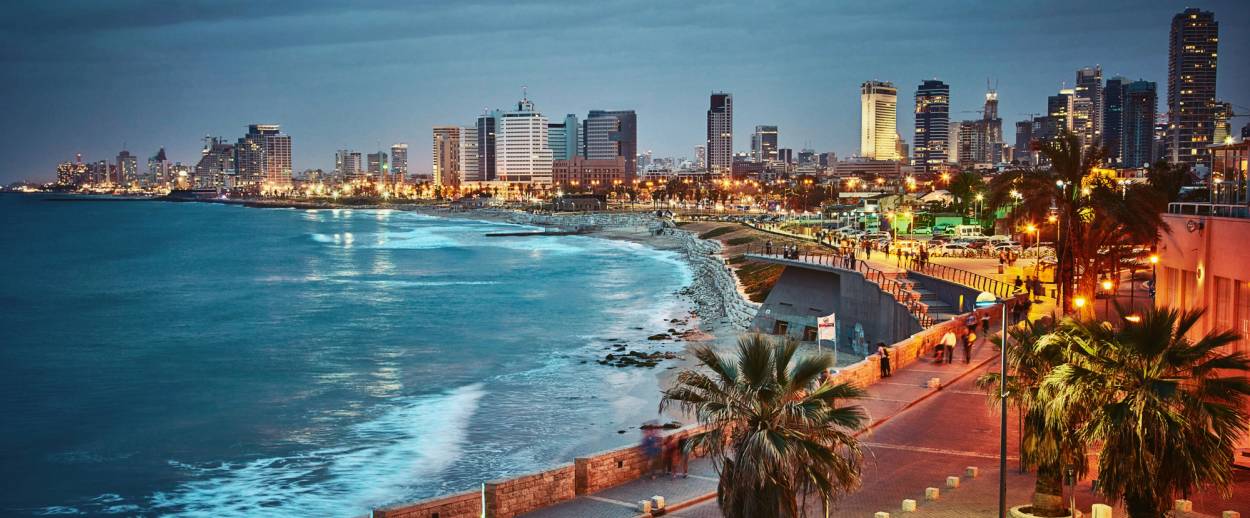Why I Learn in a Secular Yeshiva in Tel Aviv—and You Should Too
How a staunch secularist found substantive Jewish study in the heart of Israel’s sin city




When it comes to Tel Aviv and Jerusalem, the stereotypes are second nature to many:
Sin City // The Holy City
Beach // Stone
Golden Boy // Yeshiva Bocher
Parties and Cafés // Politics and Religion
These associations tend to dictate where young Jews coming to Israel opt to spend their time. A person seeking a pulsing, cosmopolitan playground might go to Tel Aviv, relishing the chance to live in a city of start-ups—a place where Judaism is less visible than Israelism, and where religion takes a back seat to culture. Meanwhile, others might head up to Jerusalem, home to many opportunities to explore religious identity and learn what it means to live fully immersed in the Jewish calendar. These explorers might experiment with keeping Shabbat or Kashrut, or enroll in one of the many Jewish learning programs that the city offers.
But in many ways, this dichotomy conceals more than it reveals. That’s because both Jerusalem and Tel Aviv are actually home to Israeli Jewish communities that don’t fit easily into the extremes of either stereotype.
And if, like me, you are a young Jew looking for a serious Jewish experience that doesn’t conform to the polarity of these traditional Jewish models—the simply sacred and the purely profane—then this Israeli middle ground might be just what you need.
So how can Diaspora Jews participate in these opportunities when they come to Israel?
One of the most substantial such Israeli initiatives of the last twenty years has been the “Secular Yeshiva.” This term rings as oxymoronic to Diaspora ears. Yet a Secular Yeshiva is exactly what it says it is: a Yeshiva, through and through, for Israeli secular Jews. These houses of study in both Tel Aviv and Jerusalem offer learning that does not assume religious belief, does not promote religious observance, and does not necessarily confine itself to the traditional textual canon. They do, however, maintain that Jewish learning is the key to forming Jewish identity. They offer a middle ground where Jewish text study can be a community-binding practice even without prayer, halakha, or divine authority.
In Jerusalem, these schools allow secular Israelis to meet a Judaism that does not overpower and command. In Tel Aviv, these schools allow secular Israelis to engage a tradition that once seemed irrelevant and outdated. The secular yeshiva movement has been a revolution, changing the conventions of Jewish engagement in the Jewish State.
For Israelis, learning at a Secular Yeshiva is a particularly poignant experience. Israelis are uniquely required to ask themselves the fundamental question that a Secular Yeshiva evokes: What does it mean to exist in the uncomfortable space where tradition meets modernity? How do we create a new space that responds to the encounter between our full past and our full present?
For me too, a Diaspora Jewish woman, learning at the Bina Secular Yeshiva in Tel Aviv transformed my Jewish identity. I grew up in a secular Zionist household, and my relationship to Israel was strong from a very early age. I was raised on stories of the pioneers, learned Hebrew, and considered Leon Uris’ Exodus a sacred text. Zionism was, for most of my life, the primary component of my Jewish identity. This is true for many non-Orthodox American Jews, for whom Israel stands in for religion.
But five years ago, as a twenty-something living in New York city, I realized that constructing my identity around a country halfway around the world was no longer tenable. And so I thought it might be time to learn something about this thing called “Judaism.”
Finding a place to do Jewish learning in New York shouldn’t be hard. Learning is after all, one of Judaism’s most important spiritual activities. But when I searched for ways to learn about Judaism, I was confronted with a problem: most of the Jewish learning in America is still happening in religious spaces. And I was a proud secularist. I wondered: could there be a way to engage traditional texts as a cultural experience? Could I find teachers who could demonstrate how to live a life full of Jewish literacy, but without Jewish observance?
So I came to Israel. And I chose Tel Aviv—yes, I am not immune to the beaches and cafes—and I enrolled at the Secular Yeshiva. It was there that I found a community that was deeply curious about Judaism and committed to real, rigorous engagement with our tradition. I also found a community that let me be fully myself—no need to pretend about how I spent my Friday nights or what I was eating for dinner. The community at the Secular Yeshiva understood that a Jewish life could be built on knowledge and personal connection while not necessarily restricted to a life of religious observance.
Learning at the Secular Yeshiva changed my life. By considering Jewish texts as a cultural literary tradition, I was able to deepen and expand my secular Jewish identity. I was exposed to the beauty of the Jewish textual tradition, and empowered to confront its teachings truly as myself. I participated in the age-old process of textual interpretation, and thus experienced firsthand how Judaism is enriched by the contributions of its community. Judaism all of a sudden became alive—an-ever-growing, ever-developing way of thinking about the world.
And for me, the most beautiful element was this: by studying at the Secular Yeshiva in Tel Aviv, I no longer had to choose between the extremes. Learning at Bina not only taught me the texts, it also taught me that it is possible to build a Jewish identity that thrives in the uncomfortable middle ground and is strengthened by its ability to incorporate its disparate elements. My Jewish identity could be about Israel and it could be about Judaism. I could be a secular Jew and have a real relationship to the tradition. I could bring a little of Jerusalem to Tel Aviv.
Ultimately, I realized that overplaying the differences between Tel Aviv and Jerusalem only plays into our own spiritual and intellectual impoverishment, further isolating the two worlds that the two cities represent. It is better to take on the responsibility of understanding the common values that these two cities share—and, in doing so, to build a personal relationship to Judaism that brings them together. The old and the new, the traditional and the progressive, the texts and our selves.
Zoe Jick is Director of the English Beit Midrash at BINA: The Jewish Movement for Social Change. She founded the only program for full-time Jewish learning in English in Tel Aviv.